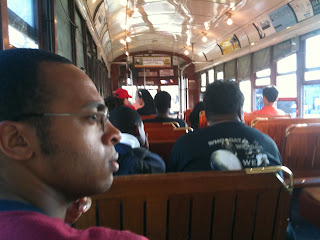Uncredited Photograph of a Road
Why None of My Students "Dig" Homer (Or Virgil)
I finally figured out why none of my students likes the Odyssey or the Iliad, or the Aeneid (except in an anti-nostalgic, oh yeah, my parents read that in High School, kind of way; or oh yeah, I am supposed to like this story because my grandfather read it in the original Greek, or oh yeah, someone told me it was good; I'm supposed to like it, like I am supposed to like Catcher in the Rye because my English teacher read it as an adolescent).
There are better narratives to pursue. That’s why.
I would love to teach Six Feet Under as an epic - or Angel the Vampire with a soul - or even heck, Mio, my Mio by Lindgren. I am flipping tired of Odysseus. He was an unlikeable twat. I really don't like him anymore. Why do we stick to the tried and true "classics"? Folks are swayed by better narratives that fit their current milieu, but we still drill them with Macbeth and Julius Caesar. Here I am teaching about the rage of Achilles where most kids have figured that out living with themselves nowadays is tantamount To Achilles’ rage. I don’t need to teach an ancient greek epic for them to figure out their own narcissistic tendencies. Now, granted, as a ninth grader, I loved the tale of the Odyssey, but my teacher was unique. She did not care if we actually “read” the book. What she would do is weave stories in class based on the epic story relating to events in real life. For example: Penelope. She would talk about the plight of the single mother—something we could relate to in the classroom, because a majority of us came from single family homes. But, even the kids who didn’t read got the gist of what my teacher was saying and passed the tests. Here I am teaching the Odyssey, about a man longing for home, but most kids don’t have a home (at least in the metaphysical sense of the word) so the story is lost on them in the reading, only to come alive when I mention that perspective.
But, I am being hyperbolic.
Both the Odyssey and the Iliad are vibrant tales. Home, loss, anger, curses, fathers, mothers, sex, honesty, revenge, you name it. The issue isn’t the brilliance of this ancient epic, but rather, the children I teach are already subsumed in their own epics. I know I am going to get fire for saying this, but TV shows nowadays—if you scan through them — have their own brand of epic tonality that beats the Ancient Greeks. Take for example Skins — a brilliant TV series from the BBC. The beginning scenes of its first episode about a Telemachus named Tony— the shenanigans of a British teenager—beat out the tumultuous fatherloss of Telemachus in the first four books of the Odyssey. Like I said, it is not that the ancient epics were not good—but heck—I am trying to teach a beautiful epic here, where kids are completely toned out. They won’t read the thing, save for a few of them, who are secretly bitter that they are the only ones reading. I have too much to compete with: Madea, Fuel, Adult Swim, American Idol (okay, here I will say the ancient epics are paramount). I am not sure anymore what makes a narrative great. I am not sure anymore about the CANNON.
I will parse my argument out better here:
... take the epic of the Odyssey. What do we want to teach when we introduce this story? Home? Right? Isn’t that the core of the story? the return home? Why the Odyssey? Why can’t we teach the same theme with something like Skins? I really don’t understand. It is funny: because an epic is more than a thousand years old, it’s legit. But, god forbid we teach a story that is only a few months old. The naysayers will say the ancient epics are better written. But, I say that is a bunch of bulls*&^. I could create a lesson that teaches everything I already teach using film and popular culture: heroes, antagonists metanoia, epiphany, journey, inner journey, archetype, you name it. I think if I teach Ancient Lit again, I am going to only teach the Odyssey, Gilgamesh, and Oedipus Rex as primary texts. Everything else will be excerpts, mixed in with television: Angel, Six Feet Under, Dexter, and Welcome to the Dollhouse.
What do you think? How do I teach the themes of Ancient Literature? Is it still relevant? Post your comments.










